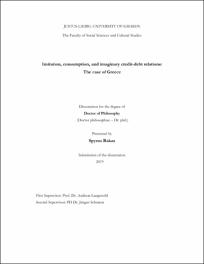| dc.description.abstract | In a referendum on July 5, 2015, a majority of 61% voted against continued austerity in Greece. On September 20 of that year, Syriza, a radical left-wing party that previously ran on an anti-austerity platform, won the elections despite announcing the adoption of a new memorandum and the continuation of austerity. This study aims to shift the question from what happened to Syriza’s radical left program to what caused the part of Greek society that initially supported this program to, in what seemed like a heel turn, passively accept the continuation of austerity measures. This question is answered through the construction of a subjectification theory (based on the concepts of imaginary credit and imaginary debt) which brings together Louis Althusser’s notions of Unique Subject and interpellation, the sociology of imitation of Gabriel Tarde, and the social imaginary of Charles Taylor. The social and political response of individuals during periods of political-economic crisis can be better understood by investigating how they create and expand their social and moral bonds, which in turn provides insight into their polity (social becoming) during the pre-crisis period. This study analyzes people’s self-governing and the reproduction of the consumption sphere, as a modern space of social becoming, through the social mechanism of imaginary credit and debt. The individuals’ desire to conform, based on an imaginary credit which allows them to freely imitate higher-status members of society and thus socially ascend, constructs an imaginary of social mobility which is then ‘paid back’ through conformity, that is, following the practices necessary for the conformist subject to close the social and the moral distance between them and the Unique Subject. This imaginary debt – that is, the desire to conform – is facilitated through political and economic channels, such as mass credit expansion and political strategies that foster the social becoming of individuals within the consumption sphere. When this moral order and social structure comes into crisis, individuals, even if they cannot repay their real debts, will still desire to pay back their imaginary debt and defend their moral order because it mediates their social coherence – the moral viability of their polity. Social and political protest and passivity during periods of crisis should thus be approached through the question of whether any of these (in)actions facilitate the established self-governing order and belonging of individuals. The case of Greece and its transition from social protest against the austerity measures to sociopolitical passivity offers a contemporary example of this process. | de_DE |



